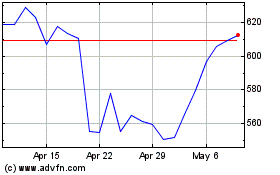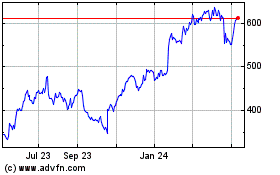Quickening Retreat From Tech Sinks Market
October 10 2018 - 4:40PM
Dow Jones News
By Corrie Driebusch
U.S. stocks suffered their biggest decline in more than seven
months Wednesday, as investors accelerated their retreat from
fast-growing technology stocks in favor of shares that have been
overlooked.
Major indexes have started the fourth quarter on their weakest
footing since the beginning of 2016, and the swift fall has some
investors wondering if this is a brief stumble or an overdue
reckoning for U.S. stocks after months of outperforming global
markets.
The rotation out of tech and other growth stocks -- among the
most popular trades of the year -- to so-called safety stocks, such
as utilities companies, was sparked in part by the recent jump in
government bond yields and the Federal Reserve's bid to tighten
monetary policy.
But there have been other warnings signals that made investors
nervous. Recent data has showed a slowdown in both housing and auto
sales, both of which are closely watched indicators of U.S.
economic health. Even more concerning: trade tensions between the
U.S. and China appear to be worsening.
The result: A simultaneous selling of 2018's biggest
stock-market winners.
Heading into the fourth quarter, there was a lot of common
positioning, particularly in large U.S. tech stocks, said Andrew
Slimmon, senior portfolio manager with Morgan Stanley Investment
Management. "If everyone is on one side of the boat and they
suddenly realize this, everyone would scramble."
The S&P 500 tumbled 3.3% Wednesday afternoon, its fifth
consecutive session of declines and longest losing streak in nearly
two years. The Dow Jones Industrial Average dropped 827 points, or
3.1%, at 25604, falling 4.4% since notching its all-time high a
week ago. Both indexes registered their biggest loss on a
percentage basis since Feb. 8.
All 11 sectors in the S&P 500 slumped Wednesday, with
technology stocks down more than 3%. Other growth sectors including
consumer-discretionary and communications shares posted big
declines as well. The tech-heavy Nasdaq Composite dropped 2.5%,
extending its declines for the month to 6.3%. The index is
suffering its worst start to a fourth quarter since 2008 when it
fell 21%.
The recent selloff has sent highflying consumer tech companies
like Netflix Inc. and Amazon.com Inc. down more than 10% since the
start of the fourth quarter, and Google parent Alphabet Inc. down
more than 5%. It's not just big-name tech companies; smaller
companies have also struggled, with semiconductor companies, as
measured by the PHLX Semiconductor index, down 2.9% on
Wednesday.
As those stocks have stumbled, investors have rushed into
utilities stocks, which are generally considered safer in a
volatile environment. Those shares rose 0.5% in the S&P 500
Wednesday, bringing their gains for the month to 3.6%.
Investors' bet on tech companies with strong earnings growth has
been a crowded one in 2018, according to Ann Larson, managing
director of quantitative research at AllianceBernstein. Her firm
identifies crowded trades by looking at the top positions of active
managers, which stakes they have been building over the past
several quarters, and which names have a high proportion of "buy"
ratings from bank analysts who cover the companies. The model also
considers how well an investment has done compared with the rest of
the market.
In the third quarter, Facebook Inc., Amazon, Microsoft Corp. and
Alphabet were among the stocks that most frequently appeared in the
largest 10 holdings of hedge funds, according to Goldman Sachs. By
another measure of concentration, global fund managers have
identified bets on the FAANG-BAT trade of Facebook, Amazon, Apple
Inc., Netflix and Alphabet as well as Chinese firms Baidu Inc.,
Alibaba Group Holding Ltd. and Tencent Holdings Ltd. as the most
crowded trade identified by investors for eight straight months,
according to a September survey by Bank of America Merrill
Lynch.
For most of 2018, these bets served investors well. Even with
the recent drawdowns, Amazon shares are up more than 50% so far
this year, while Netflix has risen roughly 75% and Apple is up more
than 30%. Of the FAANG group, only Facebook shares are down for the
year.
"Crowded trades are popular for a reason. They're good stocks.
There's just risk attached to them," said Ms. Larson.
The risks have borne out in the past when other popular trades
have unraveled. Bets against volatility fed the stock market's
tumble in February after the implosion of a number of
exchange-traded products that had risen in value when gauges of
volatility declined. Similarly, bitcoin investments tumbled at the
beginning of the year on doubts about the practical utility of
cryptocurrencies. And stocks with high dividends sold off following
the 2016 presidential election as investors bet big on growth
stocks.
This time around, some investors say such a pullback -- so long
as it's not prolonged -- is a good thing after tech's seemingly
unceasing climb higher for so many months.
"As much as it's painful short term, it's actually really
healthy longer term that they're pulling back," said Mr. Slimmon,
who added that after a reset in these momentum stocks, he could see
these company shares rising again into the end of the year.
Write to Corrie Driebusch at corrie.driebusch@wsj.com
(END) Dow Jones Newswires
October 10, 2018 16:25 ET (20:25 GMT)
Copyright (c) 2018 Dow Jones & Company, Inc.
Netflix (NASDAQ:NFLX)
Historical Stock Chart
From Mar 2024 to Apr 2024

Netflix (NASDAQ:NFLX)
Historical Stock Chart
From Apr 2023 to Apr 2024
